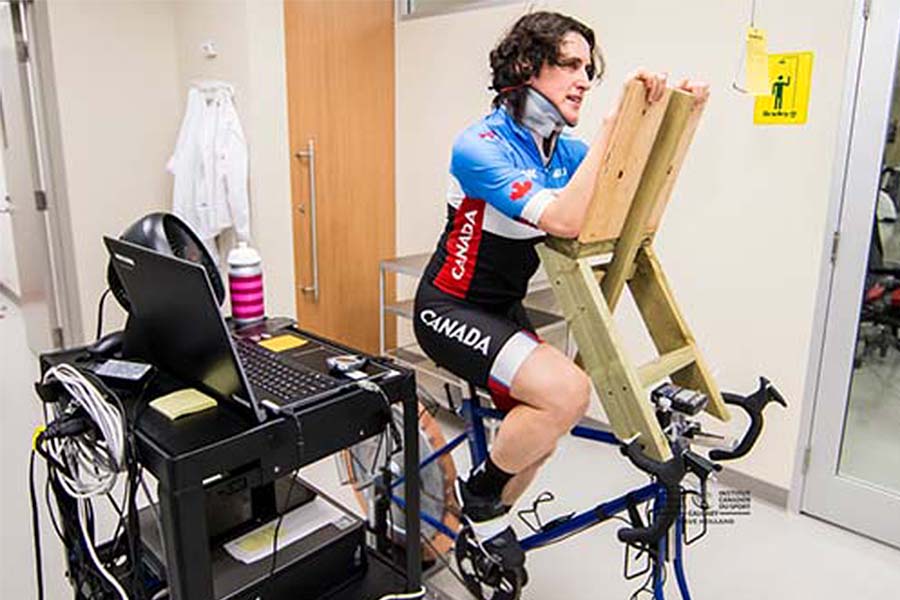
There were moments along the road to recovery where cyclist Tara Whitten felt things were not coming back the way they were supposed to. Her head and neck were immobilized in a brace for ten weeks, so that a crack in the base of her skull could heal. In order to keep training, she rode a stationary bike. “It wasn’t going well at first with the brace,” she recalls. “I was really overheating and the position was uncomfortable.”
Inexplicably, Whitten crashed head first into the back of a parked vehicle on her way back to the hotel after her final training ride in Rio at a reconnaissance camp in March. “I don’t remember what happened,” she says. “I’m missing twenty minutes of memory. I just remember seeing the back of the vehicle, it’s almost like a memory, a flash image.” The crash resulted in a concussion and crack in her occipital bone – her bike was undamaged.
Despite the setback, Whitten was able to quickly overcome her disappointment and anger. “I surprised myself when I got back and my perspective was really good. Pretty soon I accepted that I might not recover in time. I accepted that it might not happen.” Still, Whitten approached her recovery with unwavering focus and determination to do whatever she could to get back on the bike, and on the starting line in Rio.
That meant adjusting to some creative ways of enabling her to train. Dr. David Smith, Director of Sport Science at the CSI Calgary, was instrumental in helping Whitten train through her recovery. “I lay awake at night thinking about how we were going to get her on the bike with the neck brace on.” The result was a device that allowed Whitten to ride upright so that there was no downward pressure on her neck.
Coming back from serious injury just months before the Olympics took an army of support. Even before her plane touched down in Calgary, Dr. Smith had mobilized a team to help Whitten heal and get back on track for the Olympics. The team worked closely with Whitten and made adjustments almost daily to maximize her recovery.
“The CSI Calgary was incredible,” says Whitten. “I felt so supported through the whole process. There was huge collaboration between the support team and it was the best approach. I couldn’t have asked for a better team.” Dr. Smith says that Whitten did what she needed to do. “She had total trust in the support team in providing the right training and therapy, which minimized her recovery time,” he says.
Shayne Hutchins, Paramedical Lead at the CSI Calgary, worked closely with Whitten throughout her recovery and was impressed with her internal fortitude. “Her healing capacity is something special,” he says. “Healing takes an incredible amount of energy, but that plus training, therapy and stress takes a lot from a person.“
Whitten took things one day at a time. For someone used to planning out her entire season a year in advance, not knowing what would happen was challenging. “I wasn’t sure how quickly I would come back,” she says. Dr. Smith and the team had a similar outlook, “We always said we’re just going to do our best, no matter what adversity or challenge comes our way.”
Whitten still had to qualify for the Olympic team and had just one chance at a race in Quebec in early June. Her ability to race was in question up to the last minute. “Two weeks before the race Doc questioned whether I should go,” she recalls. “But as soon as I got the brace off it was night and day. I felt awesome. Just being outside again was amazing.” Doc says, “The day after the brace was off, Tara did a workout that convinced me she was ready to go.”
Perhaps not surprisingly, she placed second in that race and was the top Canadian. “I believed it was possible,” she says. “I did surprise myself in that first race back – I was thinking ‘just race, be in the moment.’” Three weeks later at the Canadian National Championships she won the time trial by 1:18, a huge margin. It meant securing her spot in Rio and regaining her potential as a medal threat.
It’s impossible to predict where Whitten might have found herself now if the injury hadn’t happened. A fork in the road that cannot be untraveled has reshaped her journey to Rio, a turn that could have ended her career. Remarkably, Whitten is unfazed by the detour. “Right now, I feel like I’m exactly where I would want to be.”
Canadian Sport Institute Calgary: @csicalgary
Written by Kristina Groves: @kngrover
Photo by Dave Holland: @csicalgaryphoto
27/07/16
